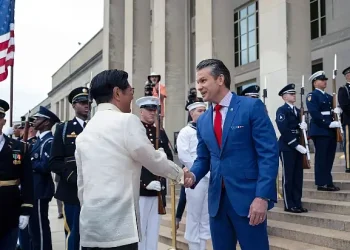Introduction
In Darwin, Australia, U.S. Secretary of Defense Lloyd J. Austin III met with Japanese and Australian defense leaders to advance security collaboration. Their joint efforts are designed to bolster regional stability, counter shared challenges, and enhance military interoperability.
This pivotal meeting underlines the U.S.’s dedication to fostering alliances in the Indo-Pacific.
Translations: Japanese
Deepening Trilateral Cooperation in the Indo-Pacific
The 14th Trilateral Defense Minister’s Meeting, held in Darwin, brought together Secretary Austin, Japanese Defense Minister Nakatani Gen, and Australian Defense Minister Richard Marles. The discussions finalized ambitious steps to expand the countries’ defense ties.
New Initiatives Announced:
- Japan will increase its role in annual trilateral amphibious training, including cooperation with the U.S. Marine Rotational Force – Darwin.
- The nations will participate in additional exercises like Southern Jackaroo and Talisman Sabre.
Austin emphasized the real-world impact of these collaborations:
“Darwin is a focal point for our expanding trilateral relationship, and our bond is delivering real security, deterrence, and interoperability.”
Expanded Military Exercises for Enhanced Readiness
Underlining the importance of practice and preparedness, the new measures will see:
- Japan joining Australia’s Exercise Orient Shield in 2025.
- Australian forces expanding participation in U.S.-led exercises such as Yama Sakura and Keen Sword.
This robust schedule of drills enhances readiness while fostering trust among the militaries. These activities also signal a unified response to maintaining freedom of navigation and security in the Indo-Pacific.
Exercise Summary at a Glance
Exercise Name |
Participation |
Benefits |
|---|---|---|
| Southern Jackaroo | U.S., Japan, Australia | Amphibious training and readiness |
| Talisman Sabre | U.S., Japan, Australia | Joint operational planning exercises |
| Orient Shield (2025) | U.S., Australia | Ground-force interoperability |
| Yama Sakura, Keen Sword | U.S., Japan, Australia (expanded roles for Australia) | Combined operations and coordination |
Strengthening Intelligence and Capabilities
Another key outcome of the meeting was a commitment to enhanced intelligence sharing. Notably, Australia will now join the Japan-U.S. Bilateral Information Analysis Cell. This cooperation aims to improve regional monitoring and decision-making capabilities.
The Main Goals of Intelligence Sharing:
- Strengthen real-time threat analysis.
- Improve surveillance and reconnaissance in strategic areas.
Additionally, leaders outlined plans to co-develop advanced defense technologies, further boosting their operational edge.
Broader Implications for the Indo-Pacific
The enhanced trilateral relationship reflects a collective vision for a free and open Indo-Pacific. Amid evolving challenges, such as territorial disputes and cybersecurity threats, this alliance serves as a deterrent against aggression while promoting peace and stability.
Two core outcomes of this partnership include:
- Reinforcing maritime security to protect critical trade routes.
- Demonstrating a united front to allies and adversaries alike.
These initiatives complement the U.S.’s broader strategy in the Indo-Pacific, which Austin has championed throughout his tenure.
Austin’s Indo-Pacific Tour Highlights U.S. Commitment
Secretary Austin’s trip to Darwin marked the beginning of a significant regional tour, which includes stops in the Philippines, Laos, and Fiji. Each visit emphasizes the U.S.’s commitment to its allies and partners.
Highlights of Austin’s Upcoming Visits:
- Philippines: Discussions on the mutual defense treaty and collaborative maritime security efforts.
- Laos: Participation in the ASEAN Defense Ministers’ Meeting-Plus, showcasing regional partnerships.
- Fiji: Announcing negotiations on a Status of Forces Agreement to deepen bilateral ties.
This marks a historic moment for U.S.-Fiji relations, as it’s the first visit by a U.S. defense secretary.
A Pivotal Moment for Regional Security
As Secretary Austin continues his Indo-Pacific tour, the trilateral meeting in Darwin sets a strong precedent for deeper regional engagement.
The U.S., Japan, and Australia have committed to concrete steps that strengthen defense cooperation, ensuring peace and stability in a dynamic and often unpredictable region.
This enduring partnership not only safeguards the Indo-Pacific but also reinforces shared values of freedom, security, and collaboration.
Sources: THX News & US Department of Defense.









